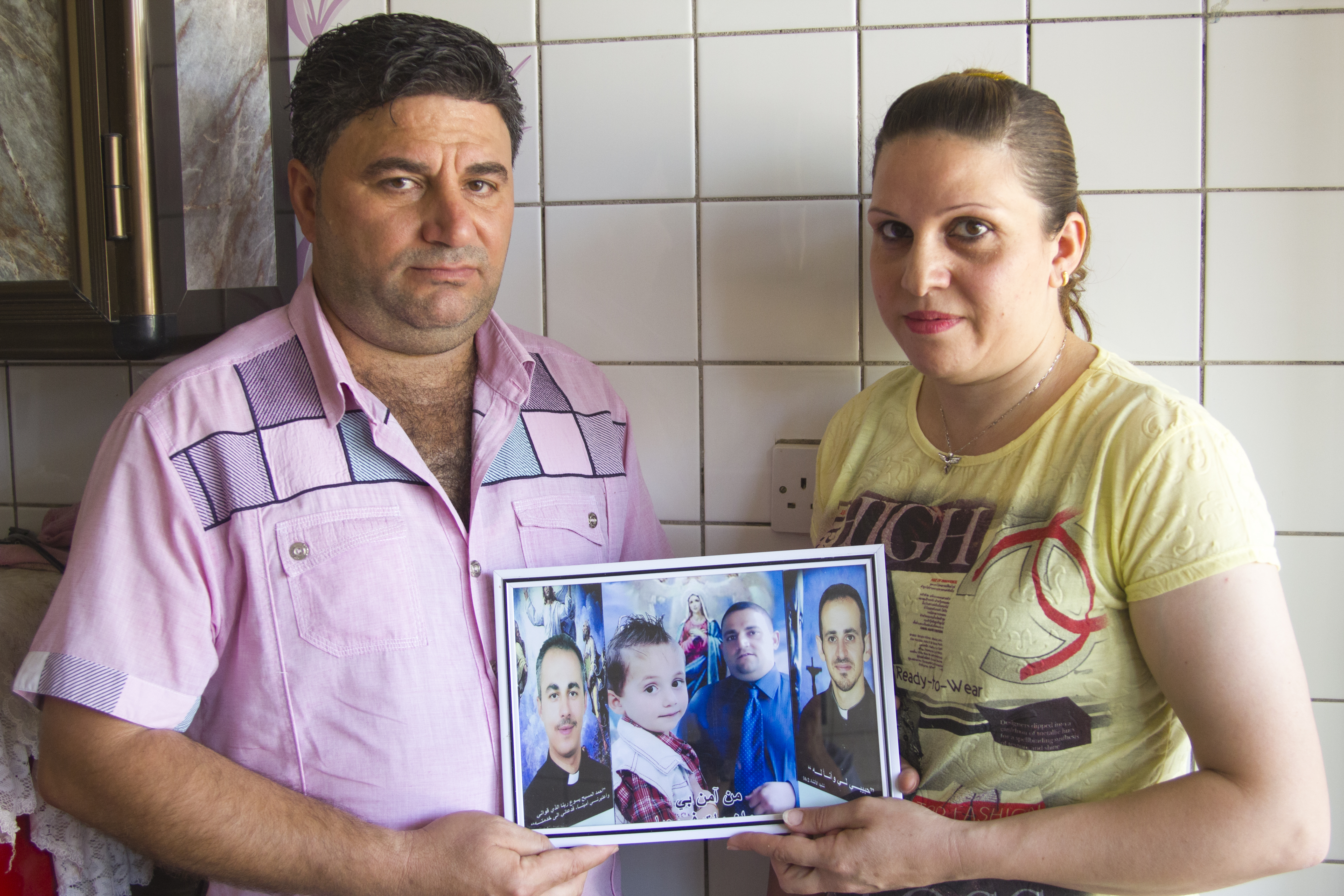Unemployed Iraqi teacher Thiar doesn’t know what to do. He and his wife Nadia hold up a picture. In it are two young priests wearing clerical collars. ‘These were my friends,’ he says.
In the centre is another young man, Uday, and his smiling three-year-old, Adam. ‘My sister’s son and his son,’ Thiar explains. ‘They were martyred.’
Cathedral stormed
In 2010, terrorists broke into the Syriac Catholic Cathedral in Baghdad, locked the doors and spent the next five hours or so shooting every member of the congregation they could find. When the Iraqi authorities finally stormed the church, at least one of the terrorists detonated a suicide vest filled with ball-bearings. At least 52 Christians died, including Uday and Adam.
In a statement, IS warned that Iraqi Christians would be exterminated unless the authorities gave in to their demands. Since then, most of Thiar’s family have emigrated to Germany. Thiar and Nadia wanted to follow suit, but they couldn’t afford to. Instead, they headed north with their three young boys to Nineveh, to the Christian enclave of Qaraqosh.
On the run again
Then in June this year, extremists swept into the area. Thiar and his family fled north again to Erbil, the capital of Kurdistan; a semi-autonomous region of Iraq wedged uncomfortably between Iran, Turkey and Syria. Despite being Sunni Muslim like the extremists, the Kurds have opened their borders to Christians and Yazidis who are fleeing from the militants.
The Kurds understand only too well what it is like to be persecuted, to be denied a homeland: ‘My family were killed when Saddam came and made war against the Kurds with chemicals,’ says government spokesman, Mariwan Naqshbandi. Saddam’s forces bombed his village, killing 20.
‘This is the only country in the region, in the Middle East where the number of Christians is rising,’ says Naqshbandi. ‘People come to Kurdistan as a safe haven. We welcome them here. I guarantee that.’
Back to Erbil
Kurdish Peshmerga troops (their name means ‘those who confront death’), managed to drive extremist forces back from Qaraqosh for a time, so Thiar and his family, twice refugees, returned home. But then the heavily armed extremists, with US weaponry plundered from the fleeing Iraqi army, pushed back. Qaraqosh fell again. And Thiar and his family returned to Erbil.
‘There is no hope, no future,’ says Thiar. ‘From 2003, we have wars and killing and fighting. And I want to run away from this country.’
Is are less than an hour away
The Chaldean Archbishop of Erbil, Bashar Warda, told Release International that many others have made the same tough decision to leave. ‘Christians have lost trust in the land and in the future,’ he says. ‘Over the last ten years the attack on Christians has been immense. Two-thirds of the Christians who were here before 2003 have left. We were above a million; now you hardly find 300,000.’
IS is little more than an hour down the road from Erbil, held back only by US airstrikes as, rather late in the day, America comes to value the Kurds as key allies in need of support and protection.
Thiar knows that if his family falls into the hands of IS they will be given the same stark choices as the Christians of Mosul: convert, submit to brutal domination and pay protection money for the privilege, or be slaughtered.
‘I just want to provide a good future for my kids’, Thiar says.
Reach out to our brothers and sisters in Christ
Nadia asks us to pray. ‘Iraq has been hurt,’ she says. ‘We need peace and security. Pray for our peace and security.’
Release International, which serves the persecuted Church worldwide, has launched an appeal to help Christian refugees in Erbil. The plan is to distribute food, water and blankets in partnership with the Foundation for Relief and Reconciliation in the Middle East (FRMME), which is run by Canon Andrew White, known as the ‘vicar of Baghdad’.
The aid will be distributed through churches in Erbil, which are currently helping upwards of 6,000 Christian refugees. Unless urgent help is given, church leaders warn there is a very real risk that the dwindling Christian presence in Iraq will be extinguished.
Thiar and Nadia. Terrorists killed members of their family. 'We have no hope no future'. Picture: Andrew Boyd
Andrew Boyd is a spokesperson for Release International, a UK-based charity that serves persecuted Christians in around 30 countries. He has just returned from a fact-finding visit to northern Iraq.




























